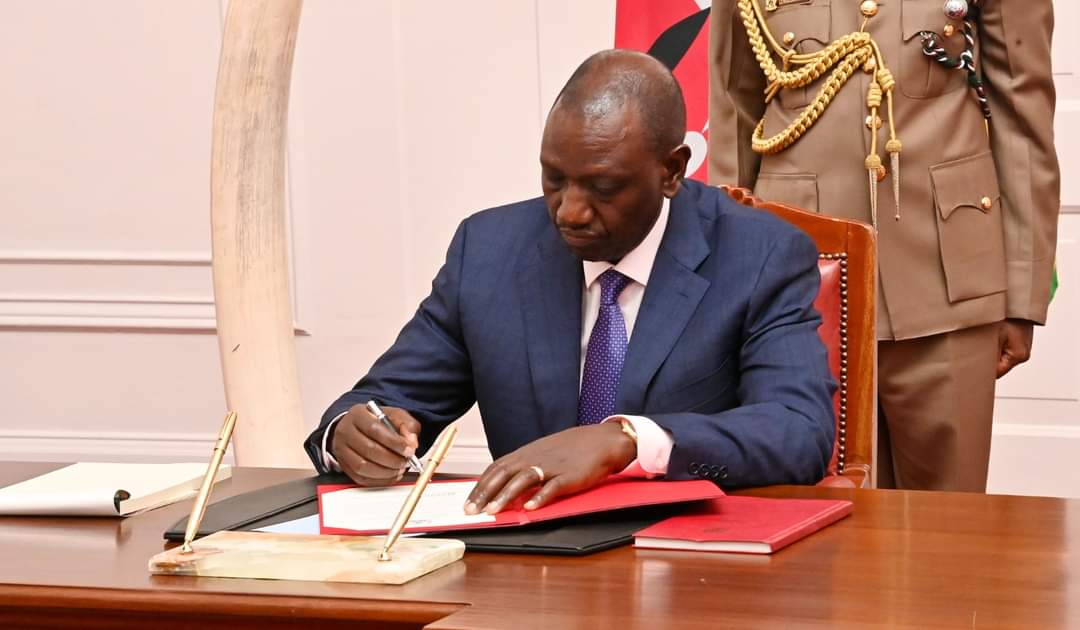Kenya was in a state of stagnation, grieving the passing of the longtime opposition figure and statesman of the nation, Raila Amolo Odinga, when a storm was stirring quietly within the confines of the power structure. As millions of Kenyans mourned, President William Ruto and his inner circle acted with precision, signing eight controversial bills into law, which triggered outrage, suspicion, and a heated debate in the country.
It could not have been a worse time. The death of Raila had seized the country, taking over headlines and hearts throughout the country. However, against the backdrop of this national tragedy, the State House approved the signing of a series of laws that critics claim is a move to destroy the Constitution, weaken institutions that oversee the government, and centralize judicial power in the hands of the executive.

President William Ruto signs a set of bills into law at State House, Nairobi.
The Eight Bills and Their Implications
1. Computer Misuse and Cybercrimes (Amendment) Bill, 2024
Intended to combat online fraud and digital crime, the law expands the government’s authority to monitor, block, and remove online content.
Risk: Legal experts caution that vague definitions of “false information” and “cyber harassment” could be used to suppress dissent, restrict media freedom, and facilitate digital surveillance of citizens.
2. Land (Amendment) Bill, 2024
This amendment transfers several key land management functions from county administrations to the national government.
Risk: Critics warn it undermines devolution and threatens community ownership of land, particularly in regions with unresolved historical land injustices.
3. Privatisation Bill, 2025
The new framework streamlines the process of selling state-owned enterprises.
Risk: By reducing parliamentary oversight, it opens the door to opaque asset sales, loss of public jobs, and the quiet transfer of national wealth to politically connected interests.
4. Virtual Asset Service Providers Bill, 2025
The law introduces licensing and regulation for cryptocurrency and digital-asset companies.
Risk: While meant to protect investors, stringent licensing may stifle innovation and push small enterprises out of the market, concentrating power in a few large firms.
5. National Police Service Commission (Amendment) Bill, 2024
This amendment alters appointment procedures and oversight mechanisms within the police service.
Risk: It weakens institutional independence and increases the executive’s control over the security sector, raising fears of political interference.
6. Wildlife Conservation and Management (Amendment) Bill, 2023
The legislation reorganises the management of wildlife conservancies and strengthens central oversight.
Risk: Conservation groups warn that it sidelines communities living around parks and reserves, reducing their participation and benefits while expanding punitive enforcement powers.
7. Air Passenger Service Charge (Amendment) Bill, 2025
The amendment raises levies on air travellers.
Risk: The move could make domestic and international air travel more expensive, affecting tourism, trade, and the cost of doing business.
8. Public Finance Management (Amendment) Bill, 2024
This law grants the executive wider discretion in reallocating public funds.
Risk: Economists and governance advocates argue that it weakens parliamentary control over public finances, reducing transparency and accountability in budget management.

The Parliament of Kenya, where the controversial bills were debated and passed. (Source: Nairobi Stock Photos)
Timing and Political Context
These bills were passed during a period of national mourning, which has heightened concerns about the government’s motives. Because opposition leaders focused on organizing funerals and the public was extremely agitated, the bills easily passed with almost no public review or political resistance. According to constitutional lawyers, the timing has been described as politically convenient and morally tone-deaf, and they have also cautioned that democratic safeguards should not be undermined in the guise of tragedy.
Public and Institutional Response
Civil society groups such as the Kenya Human Rights Commission (KHRC) and Article 19 Eastern Africa have also raised concerns about the effect that the new laws might have on the constitutional freedoms. They believe that the government has been in a hurry to pass sweeping legislative laws that are sweeping and at a time when the country was diverted, and the principle of participation of the people through the constitution was being disregarded. Some of the advocacy groups have already indicated that they would take some of the provisions to court.
A Quiet Consolidation of Power
The trend is obvious to the experienced: an executive power is concentrated strategically when the nation is distracted by other issues. But unchecked, the laws might reform the Kenyan political and economic environment so as to reduce transparency and civil rights and roll back on the progress achieved since the adoption of the 2010 Constitution.
Conclusion
The passing of Raila Odinga was the culmination of a bloodless campaign of seeking democracy, accountability, and justice. He has also passed away, and this has become the setting point of judgments that could dictate the future of the same ideals. As Kenyans grieve, the question that is left to the government with the legislative move is awkward: has the nation been honoring the legacy of Raila, or is it just chipping it down?
Read more here: Ryan Injendi Hits Out at Mudavadi Over Malava UDA Nominations

 General News7 days ago
General News7 days ago
 General News3 days ago
General News3 days ago
 Politics3 days ago
Politics3 days ago
 General News1 day ago
General News1 day ago







